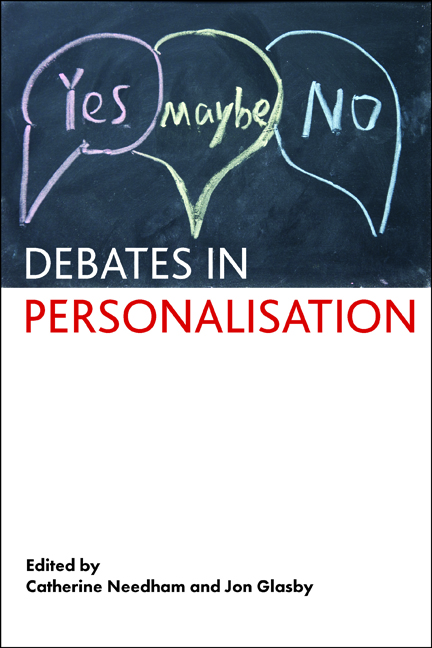Book contents
twelve - A view from social work practice
Published online by Cambridge University Press: 04 March 2022
Summary
What does ‘personalisation’ mean to me as a social worker who has been working in adult and mental health services for about ten years? It means a lot less to me now than it meant when the new language burst onto the scene in the mid-2000s. When I first started working with direct payments in adult social care, it was liberating and exciting. Contrary to some of the murmurings at the time, we, as social work practitioners, wanted people to be able to have the best quality care, which was tailored towards them. Having a professional qualification infers some skills and knowledge, but it never made or makes me an expert on the preferences of the people I work with. I became used to assessing needs based on forms and formulas, but sometimes the provision of services seemed to be lacking in terms of flexibility, choice and quality. These new policy drives were exciting – they allowed people to choose the providers they wanted and employ personal assistants whom they chose rather than forfeiting themselves to the block contracted care provided by the local authority. It was a win-win situation. There was little impact on the costs to the local authority, but the quality of care and the ethos of choice were improved for those who accessed them.
Yes, there was additional paperwork but the result was generally a highly satisfying piece of work where people we worked with were put at the forefront of choosing their own care, prioritising the needs that they felt should be met, despite what professionals might tell them. It was, and still can be, a liberating way to work that promotes real empowerment rather than the ‘empowerment’ that is granted by professional gift. It was social work. Maybe not the ‘old-fashioned, community-based social work’ that was eulogised by our lecturers whose practice was fixed at least ten years behind current policy, but it felt like it was the right thing to do.
The idea that the scope of direct payments would grow through personalisation was an exciting one. After I qualified as a social worker, I worked primarily with older people and this was a group of people who received far less funding than working-age adults with physical and learning disabilities.
- Type
- Chapter
- Information
- Debates in Personalisation , pp. 111 - 116Publisher: Bristol University PressPrint publication year: 2014



